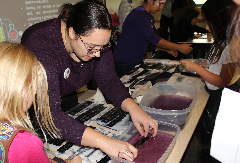Issue 32
nanoHUB is the Top Computational Materials Science Resource, According to StudynanoHUB was recently listed as the most familiar and widely used resource for Computational Materials Science and Engineering (CMSE) education in the United States.
According to a 2018 paper published in The Journal of The Minerals, Metals & Materials Society, 100% of the respondents were aware of nanoHUB, and 93% reported using it. [Source: Enrique, R.A., Asta, M. & Thornton, K. JOM (2018) 70: 1644. https://doi.org/10.1007/s11837-018-2989-7]
The survey was conducted by Raúl A. Enrique and Katsuyo Thornton of the University of Michigan, and Mark Asta of the University of California at Berkeley. It asked department chairs, faculty, and employers in the Materials Science field to rate the importance of incorporating CMSE into undergraduate curricula, ways in which it could be incorporated, current offerings in CMSE, software tools that are taught and used, and more.
According to the research paper, "The responses from the computational faculty point to a continued need for modules, including software tools and educational materials, that can be readily implemented by materials faculty regardless of their area of expertise."
nanoHUB has been a popular destination for students and educators for more than fifteen years in large part due to its well-curated collection of these educational modules, teaching materials, and computational simulation tools.
Having recently been renewed for the next five years by the NSF, nanoHUB and the Network for Computational Nanotechnology plan to continue making high-quality resources and computing power available to the community, as well as supporting the development of new materials that will keep us on the bleeding edge of nanotechnology research and education for the forseeable future.
Full paper is available to Springer subscribers
National Nanotechnology Day - October 9
National Nanotechnology Day is an annual celebration featuring a series of community-led events and activities on or around October 9 to help raise awareness of nanotechnology, how it is currently used in products that enrich our daily lives, and the challenges and opportunities it holds for the future. This date, 10/9, pays homage to the nanometer scale, 10–9 meters.
Planning for various events and activities is underway at schools, universities, and other organizations around the country. The theme for this year’s National Nanotechnology Day is “Nano in Motion,” highlighting the dynamic progress of nanotechnology. Participants also are encouraged to get active while exploring nanotechnology concepts.
nanoHUB is taking part with its Carbon Nanotube (CNT) Dance Challenge, and we want to see your moves!
How to participate:
- Get together with some like-minded friends, family, or classmates.
- Learn about the three arm geometries for the CNT Dance Challenge steps.
- Take photos of your group demonstrating the different CNT chiralities.
- Share your photos with us on Twitter, Facebook, or via DropBox!
Full instructions and hashtags for sharing your results are available at nanoHUB's National Nanotechnology Day group.
nanoHUB Community EngagementPioneering research, education, outreach, and support for nanotechnology community formation and growth drives nanoHUB. You can take part in growing nanoHUB's community engagement via:
- Groups: An easy way to share content and conversation, either privately or with the world. Participate in a group that already exists for a specific interest or topic and if you can't find the one you're looking for, start one and engage with the nanoHUB community.
- Projects: Whether working on a new funding proposal, research paper or developing an application, projects are a great way to manage your data, workflow, and communications with colleagues and members of the community.
- Q & A Forum: Not sure how a tool can be applied to a specific problem? Having trouble understanding a tricky concept? Participate in the Q&A forum by asking and answering questions and benefit the whole community. The more people participate, the stronger the forum becomes.
- Resources: Share and publish your resources including animations, papers, simulation tools, and online presentations with the nanoHUB community. We currently host over 6,000 resources, and more are being posted every day.
|
|
Upcoming Events
When: Oct. 9, 2018
9:00 a.m. - 6:00 p.m. EST
Where: Online (Zoom Meeting)
In celebration of National Nanotechnology Day, RAIN, with our partners, will be hosting simultaneous remote access demo sessions. On October 9, from 9 AM to 6 PM EDT, teachers, students and anyone who is interested will have the opportunity to experience some of the most up to date microscopy technology available.
When: Oct. 22-24, 2018
Where: Langenbeck Virchow Haus, Berlin, Germany
The Applied Nanotechnology and Nanoscience International Conference is an annual event. It hosts high-profile plenary speakers, world-class researchers, oral and poster presentations, workshops, sponsor exhibits, and afterworks. This event is a great opportunity to share your research findings with a wide audience, promote knowledge exchange, and network. Come to share during this fourth edition.

New Resources
This talk focuses on the interplay of mechanics, such as large deformation, plasticity, and fracture, with chemical reactions in Li-ion batteries.
This talk, presented by Sebastien Maeder and the NACK network, covers the following topics: an overview of scanning probe techniques, scanning tunneling microscopy, atomic force microscopy, hardware and components, and tip/sample interactions.
FOLLOW US
    
ABOUT US
Contact Us Unsubscribe
The Network for Computational Nanotechnology and nanoHUB .org are supported by the National Science Foundation.

|









